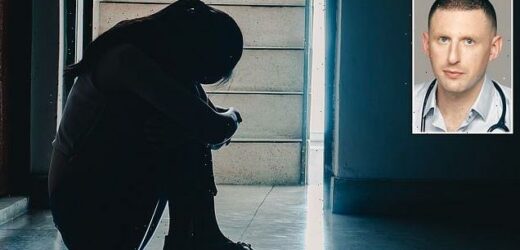DR MAX PEMBERTON: How to stop the tragic rise of eating disorders
- More than 1m children needed treatment for serious mental health problems
- The data, from over the past year, showed an increase of 82 per cent in two years
- Eating disorders specialist Dr Max Pemberton explains why he thinks this is
- Read more: DR MAX PEMBERTON: My tried and tested tips for a ‘dry-ish’ January
An epidemic of mental health problems affecting the young is becoming a full-scale public health emergency, with new data showing that more than a million children needed treatment for serious mental health problems in the past year.
The data also showed a startling increase in the number of under-18s admitted to hospital with serious eating disorders — a jump of 82 per cent in two years.
As an eating disorders specialist, I have seen first hand the increase in the number of patients being referred to my clinic, as well as those increasingly unwell patients for whom hospital admission is now the only option.
So why has this terribly sad situation developed? I think there are two reasons.
An epidemic of mental health problems affecting the young is becoming a full-scale public health emergency
The first is the rise of smartphones and social media. According to a survey conducted in 2021, 58 per cent of children aged from eight to 11 have smartphones — and 89 per cent of UK children aged eight to 17 had their own social media profiles.
We all know that images of models and celebrities in adverts are airbrushed in order to sell products, but increasingly this is also now the case for images posted by individuals, some of whom tweak and alter pictures using filtering and editing apps.
This means young children and teens are being bombarded with images that appear to have been taken spontaneously but, in reality, have been manipulated to create impossibly perfect faces and bodies.
No wonder young people feel under increasing pressure to copy these unrealistic images — with the result they are more likely to diet or work out to change their own body shape. In those who are susceptible, often due to underlying psychological and emotional difficulties, this can develop into an eating disorder.
I worked in eating disorders for ten years and many of my young patients told me they’d become obsessed with images they saw online, particularly things such as ‘thigh gaps’ (a space at the top of the thighs) on people’s Instagram accounts.
Yet they entirely failed to realise that only a tiny fraction of the population naturally look like this, and that many of the images had been digitally manipulated.
But I think there is a second reason for the rise in eating disorder admissions — and it revolves around who is prioritised for treatment within mental health services.
When I began training, it wasn’t unusual to hear of patients waiting several years to get talking therapies on the NHS for things such as mild depression.
The response to this was the establishment of the IAPT scheme (Improving Access to Psychological Therapies).
It was argued that, as well as humanitarian grounds, there was a sound economic argument for providing therapy quickly and effectively for people with depression and anxiety, as it would reduce the cost of incapacity benefit. On the basis of this, cognitive behavioural therapy (CBT) services were rolled out across the country.
At the end of the first three years of operation, in 2012, more than one million people had used the service and 45,000 people had come off benefits.
With its success over the years, the scope of IAPT has increased and it now treats a broad range of mental health conditions in adults and even some children and adolescents (as of 2019, it saw one million people a year).
Unfortunately, it has been a victim of its own success. Those with only mild symptoms are seen quickly by specially trained professionals — though they are not doctors or psychologists, which limits the complexity of conditions they can deal with.
And this is where the problems began. While money poured into IAPT services, waiting times for more complex cases, such as eating disorders, lengthened. In the specialist service where I worked, there was, at one point, a two-year wait for psychotherapy.
Yet eating disorders have the highest mortality of any mental illness, and one in five of those with a disorder will die from it.
That is a horrendous statistic — yet people are having to wait years in order to get the treatment they need.
This is not to denigrate IAPT services — they do a great job. The real problem is that with the success of IAPT, the Government feels it has nailed the difficulties of accessing psychological therapies, when, in fact, there are still shamefully long waiting lists for those who need help the most.
It is a scandal that clinicians working in services for the most unwell patients are powerless to do anything except watch as they deteriorate to the extent they need hospital admission.
So what can parents do? Find out who your children are following on social media and why; and encourage them to unfollow those people who aren’t portraying real bodies positively.
For parents who are worried their child might already be showing signs of an eating disorder, please feel emboldened to push for referrals to specialist services. If the waiting list is long, try phoning regularly to see if there are cancellations.
It can be difficult to know what to say and how best to proceed, so you can also get support from the eating disorder charity BEAT. Finally, there is an excellent book, Getting Better Bite By Bite by Professor Janet Treasure, which can also help.
DR MAX PRESCRIBES…
Who doesn’t need a pick-me-up right now? Matilda The Musical, starring Emma Thompson as Miss Trunchbull, is the perfect antidote to a dreary January.
I absolutely loved the musical when I saw it in the West End a while back and the film is just as good.
Yes, it’s a children’s story but the script and Tim Minchin’s songs mean adults get plenty from it, too.
Who doesn’t need a pick-me-up right now? Matilda The Musical, starring Emma Thompson as Miss Trunchbull, is the perfect antidote to a dreary January
Procrastination is the thief of time, so the saying goes — and a new study seems to support it. It found that those with a tendency to dither and delay not only waste time but are more likely to be unhealthy, financially worse off and depressed. Delaying never makes things easier — and, usually, quite the opposite.
There’s no doubt that some people have more of a tendency to put off doing things than others. This is particularly true of people who are perfectionists but also lack confidence in their ability.
Years ago, writing my first book, I worried it wasn’t going to be good enough, so put it off for months, despite having a book deal. A friend told me to write ‘1,000 any words’ each day. I wasn’t to worry about the words, I just had to get something down on paper.
This lowering of expectations liberated me to write, and now I’m a great fan of the phrase ‘done, not perfect’. Accepting that something won’t be perfect is the key to cutting through procrastination.
Hugh Jackman has spoken about his close relationship with his late father and how emotionally hard it was filming scenes in his new movie, The Son. Jackman’s father died while he was making the film, which is about a troubled teenager’s relationship with his dad.
Hugh Jackman has spoken about his close relationship with his late father and how emotionally hard it was filming scenes in his new movie, The Son
Jackman said: ‘My mother left when I was eight, so my father raised us. He taught me really great values. A lot of who I am today is because of him.’
I’ve no doubt that it must have been incredibly painful to lose his father, but I hope he can take some solace in having had such a wonderful relationship. So many other men, unfortunately, cannot say the same.
All too often, families split up and the father drifts off, but the damage caused by this loss of a role model can last for ever.
I’ll probably get pilloried for saying it, but after seeing troubled young men for years, my conclusion is that young boys need a father.
READ MORE:
Gwyneth Paltrow, 50, poses for cheeky snap in skimpy black bikini as she celebrates New Year’s Eve with lookalike daughter Apple, 18, son Moses, 16, and mum Blythe Danner, 79
What type of Dry January drinker are YOU? From the ‘Weekend Wobbler’ who slips up on a Friday to ‘The Flake’ who fibs about how much they’ve had, expert reveals the 9 personalities – and how to stay on track
Everything you need to know before starting dry January: As millions prepare to go cold turkey on alcohol for a month, MANSUR SHAHEEN’s video guide explains all the pros and potential cons… including that it can lead to ‘wet February’
Source: Read Full Article





